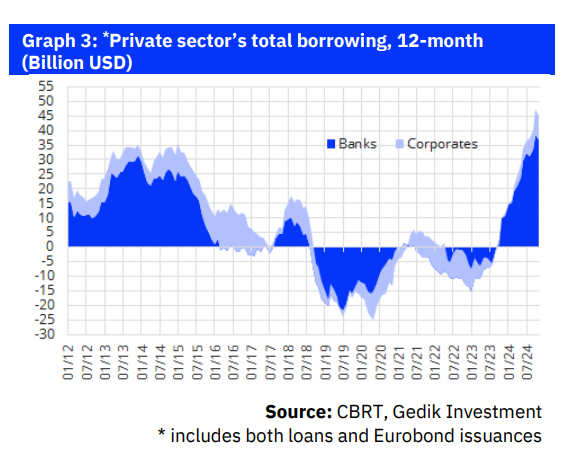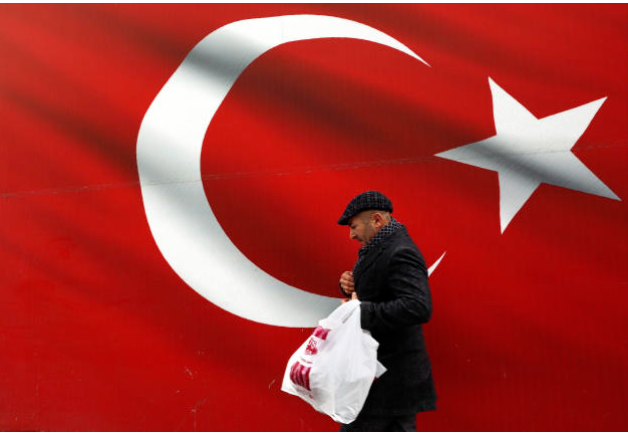December PMI data revealed that Türkiye's manufacturing activity has been contracting for the sixth month. The contraction is not that sharp. But ISO PMI fared below the threshold value of 50 for 5 months, dropping to 47.4 in December. The gradual slowdown continues, month by month.
The reason is the gradual slowdown in exports and domestic sales. In 2024, the momentum in the manufacturing industry and exports will weaken significantly.
Growth will turn out to be 4.4 percent in 2023, 1.1 points below the previous year. This year's growth forecast was also given as 4 percent. This means the slowdown will last a little longer.
[embed]https://www.youtube.com/watch?v=XRth6og83X8&t=10s[/embed]
Monetary tightening will continue after the election in order to reduce inflation. Interest rates will remain high, suppressing domestic demand. With the deceleration of domestic demand, companies will be encouraged and forced to export.
There is already a complete saturation in demand for many sectors and goods. For example, housing demand is extremely low due to lack of purchasing power. There was a 15 percent decrease in sales in the summer annually.
Automobile demand for imported cars is still alive. It is expected that demand and prices, which have accelerated since 2016, will reach saturation level with rising interest rates.
White goods, electronic goods and other durable goods’ purchases were soaring due to the effect of negative interest rates as well as the accelerating inflation in recent years. Similar to high-ticket housing sales, sales for these items are expected to slow down, too.
[embed]https://www.youtube.com/watch?v=XnMr1yGx0Hs&t=14s[/embed]
Food, defense and health are among the sectors that will not experience stagnation in demand. But their performance is not enough to keep growth high.
NO STRENGTH IN EXPORTS
There are also reasons that undermine export growth. The main factor here is the stagnation in export markets. Some countries in Europe are in recession and some are on the verge of recession. This situation especially hits the sales of the textile and apparel industry.
In addition to the shrinking of foreign markets, our second difficulty in exports is that Turkish products are now becoming more expensive. This situation is observed in both goods and tourism sectors.
In addition to the costs increased by inflation, failure to carry out structural reforms also leads to loss of productivity. Houses and Turkish products are no longer cheap for foreigners.
A similar situation occurs in the housing sector. Rising house prices hurt sales in cities popular with foreigners.
MASSIVE EROSION IN COMPETITIVENESS
In fact, in my previous article, I stated that the real loss of value in TL, which has continued for 12 years to reach 61.5 percent by year-end 2023, cannot compensate for the decline in competitiveness.
Exports are stagnating. The government is bragging about a new record in 2023, but the increase in exports was only 0.64.
A more positive development is the 0.51 percent decrease in imports. As a result, foreign trade deficit decreased from 109.5 billion dollars to 106 billion dollars, shrinking by 3.2 percent.
It is important to note that import figures include gold imports of 10 billion dollars and automobile imports of 15 billion dollars in 2023.
As interest rates return to normal and with March elections so to be behind us, domestic demand increase will not continue. Therefore, imports may return to normal this year and next year.
INVESTMENT GOOD IMPORTS OF 52.5 BILLION DOLLARS
In addition, there is another rapidly growing item in imports, and there is a possibility that interest rates may slow that down, too, depending on the political and regulatory environment. And that is the import of investment goods. It increased from $40.5 billion the previous year to $52.5 billion last year. It marks a record in terms of machinery and equipment imports.
Will machinery and equipment investments, which have completed their fourth consecutive year of expansion for the first time in history, continue to increase in their fifth year, with businesses trusting the future of the economy?
Or will it lose momentum due to rising spare capacities, slowing domestic demand, and rising interest rates?
If it loses momentum, there will be a decrease in total imports, but this can be interpreted as negative development rather than a positive situation.
In this sense, slower import demand means that in the coming years, Turkish entrepreneurs do not have enough confidence in themselves, the government and the future, and they will resort to reducing investments. The strong investment momentum will break.
By Abdurrahman Yildirim
Follow our English language YouTube videos @ REAL TURKEY:
https://www.youtube.com/channel/UCKpFJB4GFiNkhmpVZQ_d9Rg
And content at Twitter: @AtillaEng
Facebook: Real Turkey Channel:
https://www.facebook.com/realturkeychannel/
 sanayi2
sanayi2





